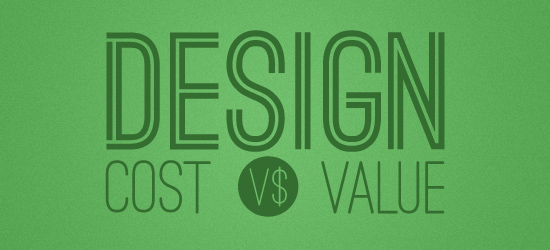Wondering what your options are for funding your app idea? What about monetizing it? From various funding models to the most common monetization strategies, the Guide to Funding & Monetizing Your App has the answers you're looking for.
Design: Cost Vs. Value
BusinessThe other day, I was surfing reddit. I swear it was on the weekend. Anyway, somewhere in a redditland conversation, someone posted this comment: I think you’re confusing cost with value. This got me to thinking – of course, in terms of running a graphic & web design business – how many of us confuse cost with value, and how does this affect our business as a whole?

What is Cost?
Dictionary.com defines cost as “the price paid to acquire, produce, accomplish, or maintain anything: the high cost of a good meal.” It’s pretty straightforward: “This magazine cost me $5.95”. “The cost of this website came to $3,500”. Essentially, it is simply the price paid, when all is said and done, in monetary terms.
Hit the jump for the whole article!
What is Value?
In turn, Dictionary.com defines value as “relative worth, merit, or importance: the value of a college education; the value of a queen in chess.” A little more vague, to be certain, than the cost definition. However, if we continue with their college education analogy, we can look at it like this:
At the time of this writing, the cost of a business degree from the University of Alberta is about $26,800 ($6,700 per year times four years). But what is the value of this degree? A key phrase from the Dictionary.com definition is “relative worth” – it depends on the region you’re in, the industry you end up in, and a whole bunch of other variables. However, for the sake of argument, let’s use eHow’s figures: business degree holders average about $40,000/yr to start, $43.5K/yr by the fourth year, and about $76K/year by their 20th year.
So, you pay $26,800 over four years to get a business degree, but having this degree may enable you to make $40,000 a year to start (compared to less, presumably, if you don’t have this degree). Of course, you may be able to make $40,000 a year without a business degree if you know the right people or perhaps are a bit lucky. But for some people, the cost of the degree is nothing compared to the value, or relative worth, of having that degree since they’ll be able to make markedly more income over the years due to having their business degree (not to mention the fact they’ll have the know-how to operate efficiently in their position).
How Do We Apply This to Design as a Business?
In a nutshell: Stop thinking of the cost of your services, and start thinking of the value of your services. This will allow you to price yourself accordingly – so long as you don’t overestimate your own value.
For example, some designers charge $250 for a logo design. This is the cost of this service. Perhaps they’ve come to this cost because it’s all they think their clients will pay; perhaps it’s because they charge $25 an hour and they figure 10 hours of work is suitable for a logo. But before you start thinking of the cost of your services, think of the value. If you’re a talented identity designer, you can build a strong visual identity for a company that will last years & years; it will work across all mediums; it will help the company in being recognized as professional/inviting/experts in their field (or whatever the goals of the business are defined as). This identity, done properly, can directly influence that business’ income for years to come. With all that said – does $250 for a logo still sound like enough? I’d wager no, because the value, or relative worth/merit/importance, of the identity is worth much, more more.
Let’s look at in terms of web design & development. If you’ve designed an interface that will double your clients’ online sales, what is its value? Pretty huge, I’d say. But if it took you 10 hours at $25/hr, you need to re-evaluate your pricing scheme. You’re not valuing yourself or your work enough – either you need to charge based on the value of the work you did, or you need to up your hourly rate to reflect the value of your services.
Common Pitfalls to Avoid
There are a few things us designers need to be wary of with this cost vs. value method of thinking. First, don’t overestimate your value or the value of the services you provide. Our friends at https://techwitty.com.au/app-development/ say that you really should see what’s out there in terms of competition; see what’s out there in terms of quality; see what’s out there in terms of clientele. Keep in mind: we work in design every day, so it’s easy for us to see the value in good design, and potentially overestimate it. Conversely, don’t underestimate your value either.
Secondly, it can be difficult to communicate the value of design services compared to cost of design services. Clients never call you up and ask “What is the value of your web design services?” No, they ask “How much does a website cost?” You need to answer their questions clearly, but don’t be afraid to expand on the answer. Instead of answering “$4,000” to the latter question, perhaps say “Our average cost comes in at $4,000, but the value of our services is significantly more. For example, our last client saw an __% increase of online sales as soon as the new site launched”. Giving more detail and hard stats like these can help the client see the value in what designers do.
Overall, the key to successfully valuing your services is to truly comprehend what you do and how it affects your clients and their business, and to have confidence in communicating these things to your clients (both existing and potential). If you can do these things, you’re well on your way to an effective valuation of your services.
